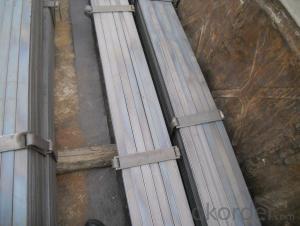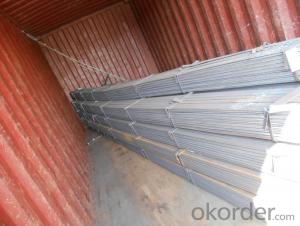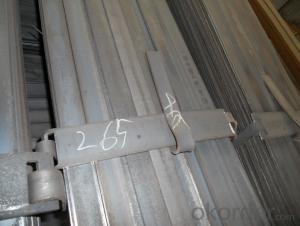Chinese Prime Hot rolled Spring Steel Bar/billet/products JIS standard/Europe standard/ ASTM standar
- Loading Port:
- Shanghai
- Payment Terms:
- TT OR LC
- Min Order Qty:
- 100 m.t.
- Supply Capability:
- 1200 m.t./month
OKorder Service Pledge
OKorder Financial Service
You Might Also Like
Specifications
Spring steel flat bar
Garde: 60Si2Mn, 60Si2MnA, 55CrMnA,50CrVA
Standard GB,JIS,ASTM,DIN,AISI,BS
LF & VD forge;ISO&TUV appr
Materials
Q195,Q215,Q235B,Q345B,
S235JR/S235/S355JR/S355
SS440/SM400A/SM400B
Product Category
Metallurgy,Mineral &Energy
Technique
HOT ROLLED
Packing
1.Big OD:in bulk
2.Small OD:packed by steel strips
3.woven cloth with 7 slats
4.according to the requirements of customers
Usage
Mechanical&manufacture,Steel strcuture,
Shipbuilding,Bridging,Automobile chassis
Main market
Middle East,Africa, Asia and some Uropean country and America ,
Australia
Country of origin
China
Productivity
15000 Metric Tons pet Month
Remark
Payment terms :T/T ,L/C
Terms of trade :FOB ,CFR,CIF ,DDP,EXW
Minimum order : 10 tons
Lead time :on or before 3-15 working days .
- Q:What are the challenges in heat treatment of special steel?
- Some challenges in the heat treatment of special steel include achieving the desired hardness and strength without compromising other properties, such as toughness and corrosion resistance. Special steels often have complex compositions, which can make it difficult to accurately control the heat treatment process. Additionally, heat treatment of special steel can be time-consuming and costly due to the need for precise temperature and time control, as well as the potential for distortion or cracking during the heat treatment process.
- Q:What are the characteristics of tool steel?
- Tool steel is a type of steel that possesses several distinctive characteristics. Firstly, it is known for its exceptional hardness, making it highly resistant to wear and abrasion. Additionally, tool steel has excellent toughness and strength, allowing it to withstand high impact forces without fracturing. It also exhibits good heat resistance, retaining its hardness and strength even at elevated temperatures. Another notable characteristic of tool steel is its ability to be easily shaped and machined, making it a preferred choice for manufacturing tools and equipment. Overall, the key attributes of tool steel include hardness, toughness, strength, heat resistance, and machinability.
- Q:How does special steel contribute to the mining aftermarket industry?
- Special steel contributes to the mining aftermarket industry by providing high-strength and durable materials for various mining equipment and machinery. It enhances the performance and longevity of mining components such as drill bits, conveyor belts, crushers, and cutting tools. The use of special steel in these applications improves productivity, reduces downtime, and lowers maintenance costs, thus playing a crucial role in the efficiency and profitability of the mining aftermarket industry.
- Q:What are the main applications of special steel in the defense vehicles?
- Special steel is used in defense vehicles for various critical applications. It is particularly important in the manufacturing of armor plates, which provide protection to military vehicles against ballistic threats. Special steel is also used in the production of components like suspension systems, axles, and chassis, ensuring durability and strength in harsh conditions. Additionally, it is utilized in the construction of weapon systems, such as missile launchers and gun barrels, due to its high tensile strength and resistance to extreme temperatures. Overall, special steel plays a crucial role in enhancing the performance and survivability of defense vehicles.
- Q:What are the common challenges in casting special steel?
- Casting special steel can pose several challenges due to its unique properties and composition. Some of the common challenges in casting special steel include: 1. High melting point: Special steels often have higher melting points compared to regular carbon steels. This requires the use of specialized equipment and techniques to achieve the required temperature for casting. 2. Alloying elements: Special steels often contain alloying elements such as chromium, nickel, molybdenum, or vanadium. These elements enhance the steel's properties but can also increase the complexity of the casting process. Proper control and understanding of the alloying elements are necessary to ensure the desired mechanical properties in the final product. 3. Oxidation and decarburization: During the casting process, special steel can be susceptible to oxidation and decarburization. The high temperatures and exposure to oxygen can result in surface defects and loss of carbon content, which can compromise the steel's strength and hardness. Careful control of the casting parameters, such as atmosphere and mold design, is necessary to minimize these issues. 4. Shrinkage and porosity: Special steels often have a higher shrinkage rate during solidification compared to regular steels. This can result in shrinkage defects and porosity within the castings. Proper gating and riser design, as well as the use of suitable feeding systems, are crucial to mitigate these issues and ensure sound castings. 5. Thermal stresses: Special steels may exhibit higher thermal expansion coefficients, which can lead to significant thermal stresses during the cooling and solidification process. These stresses can cause cracking and distortion in the castings. Proper design considerations, such as the use of chills or controlled cooling techniques, are essential to minimize thermal stress and maintain dimensional stability. 6. Machinability: Special steels, particularly those with high alloy content, can be challenging to machine due to their hardness and toughness. Casting defects such as inclusions, segregations, or non-uniform microstructure can further complicate the machining process. Proper selection of cutting tools and machining parameters is necessary to achieve the desired dimensional accuracy and surface finish. In summary, casting special steel presents several challenges related to high melting points, alloying elements, oxidation, shrinkage, porosity, thermal stresses, and machinability. Overcoming these challenges requires a thorough understanding of the material properties, precise process control, and the implementation of appropriate casting techniques.
- Q:How does special steel contribute to the automotive emission reduction?
- Special steel contributes to automotive emission reduction in several ways. Firstly, it is used in the manufacturing of lightweight components, such as the body and chassis, which helps to reduce the overall weight of the vehicle. This, in turn, improves fuel efficiency and reduces emissions. Additionally, special steel can be used to produce more durable and efficient engine parts, such as pistons and crankshafts, which enhance the overall performance of the engine and reduce emissions. Furthermore, special steel is also utilized in the production of exhaust systems, where its high temperature resistance and corrosion resistance properties help to improve the efficiency of catalytic converters, leading to lower emissions of harmful pollutants. Overall, the use of special steel in the automotive industry plays a crucial role in reducing emissions and promoting environmental sustainability.
- Q:What is the importance of heat treatment in special steel?
- Heat treatment is crucial in the production of special steel as it significantly impacts its mechanical properties and performance. By subjecting the steel to controlled heating and cooling processes, heat treatment can enhance its hardness, strength, toughness, and resistance to wear and corrosion. Additionally, heat treatment helps to refine the microstructure of the steel, improving its grain size and distribution, which further enhances its mechanical and metallurgical properties. Overall, heat treatment plays a vital role in optimizing the performance and durability of special steel, making it suitable for various applications in industries such as automotive, aerospace, and construction.
- Q:What are the different types of coatings for special steel?
- There are several types of coatings that can be applied to special steel to enhance its performance and protect it from various environmental factors. Some of the common types of coatings for special steel include: 1. Zinc-based coatings: These coatings, such as galvanized steel, provide excellent corrosion resistance. The zinc layer acts as a sacrificial barrier, protecting the underlying steel from rusting. 2. Epoxy coatings: Epoxy coatings are highly resistant to chemicals, moisture, and abrasion. They are often used in industries where the steel is exposed to harsh conditions or corrosive substances. 3. Powder coatings: Powder coatings offer a durable and attractive finish to special steel. They are applied as a dry powder and then cured under heat, forming a hard, protective layer that is resistant to chipping, fading, and corrosion. 4. Ceramic coatings: Ceramic coatings are known for their high-temperature resistance and excellent thermal insulation properties. They are often used in applications where the steel is exposed to extreme heat or rapid temperature changes. 5. Organic coatings: Organic coatings, such as acrylics and polyurethanes, provide a protective barrier against moisture, UV radiation, and chemicals. They are commonly used in outdoor applications, such as architectural structures or automotive parts. 6. Phosphate coatings: Phosphate coatings are primarily used as a pre-treatment before applying other coatings or paints. They improve adhesion and corrosion resistance of subsequent layers, providing a more durable finish. 7. Polymer coatings: Polymer coatings offer excellent resistance to abrasion, impact, and chemicals. They are commonly used in industrial settings where steel is subject to heavy wear and tear. It is important to select the appropriate type of coating based on the specific requirements of the special steel and the environment it will be exposed to. Each coating type has its own set of advantages and limitations, so a thorough analysis should be conducted to determine the most suitable option.
- Q:How is special steel manufactured?
- Special steel is manufactured through a complex process that involves melting, refining, and shaping steel with precise chemical compositions and desired properties. This may include alloying steel with various elements, such as chromium, nickel, or molybdenum, to enhance its strength, corrosion resistance, or heat resistance. The steel is then formed into desired shapes through techniques like rolling, forging, or casting. The manufacturing process also involves strict quality control measures to ensure the final product meets the specific requirements of various industries, such as automotive, aerospace, or construction.
- Q:Can special steel be used in the aerospace defense industry?
- Yes, special steel can be used in the aerospace defense industry. It is commonly used for manufacturing various components and structures in aircraft and defense systems due to its high strength, durability, and resistance to extreme temperatures and corrosion.
1. Manufacturer Overview |
|
|---|---|
| Location | |
| Year Established | |
| Annual Output Value | |
| Main Markets | |
| Company Certifications | |
2. Manufacturer Certificates |
|
|---|---|
| a) Certification Name | |
| Range | |
| Reference | |
| Validity Period | |
3. Manufacturer Capability |
|
|---|---|
| a)Trade Capacity | |
| Nearest Port | |
| Export Percentage | |
| No.of Employees in Trade Department | |
| Language Spoken: | |
| b)Factory Information | |
| Factory Size: | |
| No. of Production Lines | |
| Contract Manufacturing | |
| Product Price Range | |
Send your message to us
Chinese Prime Hot rolled Spring Steel Bar/billet/products JIS standard/Europe standard/ ASTM standar
- Loading Port:
- Shanghai
- Payment Terms:
- TT OR LC
- Min Order Qty:
- 100 m.t.
- Supply Capability:
- 1200 m.t./month
OKorder Service Pledge
OKorder Financial Service
Similar products
New products
Hot products
Hot Searches
Related keywords






























